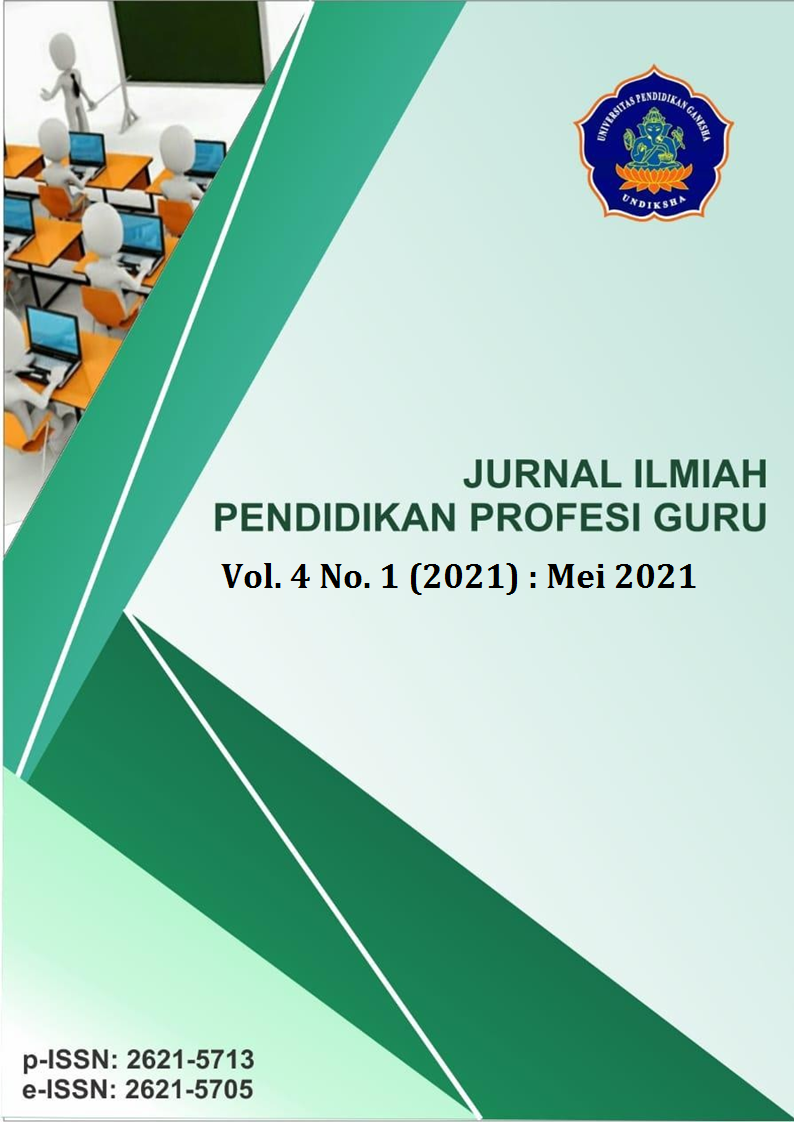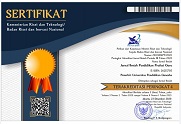Analisis Pembelajaran Matematika Materi Bangun Ruang Kubus dan Balok dengan Menggunakan Model Konstruktivisme Berbasis Lingkungan
DOI:
https://doi.org/10.23887/jippg.v4i1.29859Keywords:
Constructivism Learning Model, EnvironmentAbstract
This research is motivated by the students' scores in learning mathematics on the subject of cube and block shapes and students' interest in mathematics. This study aims to analyze the model of environmental-based constructivism in mathematics learning materials for building blocks and cubes in elementary schools. The design of this research is a quantitative descriptive research design that is directed to analyze the application of the environmental-based constructivism learning model conducted by teachers in mathematics. Interview, observation, and documentation methods are data collection techniques used by researchers. Validation of data using triangulation of sources and techniques. While the data analysis technique is by collecting, reducing, presenting, and drawing conclusions of data. The results showed that there was a fairly good increase from 10 students who scored well to 18 students who had good grades so that if the percentage was made, it was 78,3% for students with good grades and 21,7% for children whose grades were not good or not. can meet the KKM. Based on the results of these studies, it can be concluded that the use of environmental-based constructivism learning models can influence student learning outcomes well.
References
Azhari, B., & Irfan, A. (2018). Model-Eliciting Activities Dalam Menganalisis Kreativitas Pemecahan Masalah Matematika Pada Mahasiswa Pendidikan Matematika Di Ptkin Aceh. Al-Khawarizmi: Jurnal Pendidikan Dan Pembelajaran Matematika, 2(1). https://doi.org/10.22373/jppm.v2i1.4495. DOI: https://doi.org/10.22373/jppm.v2i1.4495
Azman, A., Jalinus, N., Ambiyar, A., & Giatman, M. (2020). Model Pembelajaran Konstruktivisme dalam Pembelajaran Matematika Teknik. Jurnal Teknik, 14(1), 142–147. https://doi.org/10.31849/teknik.v14i1.4218. DOI: https://doi.org/10.31849/teknik.v14i1.4218
Dipayana, I. K. M., Gading, I. K., & Japa, I. G. N. (2019). Pengaruh Pendekatan Pembelajaran Matematika Realistik Indonesia terhadap Hasil Belajar Matematika Ditinjau dari Minat Komputasi. Mimbar PGSD Universitas Pendidikan Ganesha, 7(3). https://ejournal.undiksha.ac.id/index.php/JJPGSD/article/view/19466/11529.
Harianti, F. (2018). Pengaruh Model Pembelajaran Guided Discovery Learning Terhadap Kemampuan Pemahaman Dan Hasil Belajar Siswa Materi Operasi Aljabar Kelas Vii Smp. MusT: Journal of Mathematics Education, Science and Technology, 3(1), 82–91. https://doi.org/10.30651/must.v3i1.1611. DOI: https://doi.org/10.30651/must.v3i1.1611
Hasanah, N., Holilulloh, H., & Nurmaisa, Y. (2016). The Influence Of Teachers’ Teaching Discipline Toward The Students’ Learning Activity In Senior High School. Eduhumaniora, 5(2). https://doi.org/10.17509/eh.v5i2.2842. DOI: https://doi.org/10.17509/eh.v5i2.2842
Jannah, M. M., Supriadi, N., & Suri, F. I. (2019). Efektivitas Model Pembelajaran Visualization Auditory Kinesthetic (Vak) Terhadap Pemahaman Konsep Matematis Berdasarkan Klasifikasi Self-Efficacy Sedang Dan Rendah. AKSIOMA: Jurnal Program Studi Pendidikan Matematika, 8(1), 215–224. https://doi.org/10.24127/ajpm.v8i1.1892. DOI: https://doi.org/10.24127/ajpm.v8i1.1892
Juniarti, N. K. R., Margunayasa, I. G., & Kusmariyatni, N. (2020). Hubungan Antara Pola Asuh Orang Tua dan Konsep Diri dengan Kompetensi Pengetahuan Matematika Siswa. Jurnal Ilmiah Sekolah Dasar, 4(1), 17. https://doi.org/10.23887/jisd.v4i1.24273. DOI: https://doi.org/10.23887/jisd.v4i1.24273
Primayana, K. H., Lasmawan, W., & Adnyana, P. B. (2019). Pengaruh Model Pembelajaran Kontekstual Berbasis Lingkungan Terhadap Hasil Belajar Ipa Ditinjau Dari Minat Outdoor Pada Siswa Kelas IV. Jurnal Pendidikan Dan Pembelajaran Ipa Indonesia, 9(2), 72–79. DOI: https://doi.org/10.23887/jipp.v2i2.15606
Purwaningtyas, P., Dwiyogo, W. D., & Hariyadi, I. (2017). Pengembangan modul elektronik mata pelajaran pendidikan jasmani, olahraga, dan kesehatan kelas XI berbasis online dengan program edmodo. Jurnal Pendidikan: Teori, 2(1), 121–129. http://journal.um.ac.id/index.php/jptpp/article/view/8471/4100.
Rivaldi, K. H. O., Putra, D. K. N. S., & Putra, I. K. A. (2018). Pengaruh Model Pembelajaran Problem Based Learning Berbantuan Audio Visual Terhadap Penguasaan Kompetensi Pengetahuan IPA. Jurnal Ilmiah Sekolah Dasar, 2(2), 128. https://doi.org/10.23887/jisd.v2i2.15494. DOI: https://doi.org/10.23887/jisd.v2i2.15494
Setyadi, D., & Qohar, A. (2017). Pengembangan Media Pembelajaran Matematika Berbasis Web Pada Materi Barisan Dan Deret. Kreano, Jurnal Matematika Kreatif-Inovatif, 8(1), 1–7. https://doi.org/10.15294/kreano.v8i1.5964 DOI: https://doi.org/10.15294/kreano.v8i1.5964
Sudarma, I. K. (2018). Pengembangan Media Interaktif Matematika Untuk Siswa Kelas Vii Di Sln Negeri Singaraja. Jurnal Edutech Undiksha, 6(1), 89–98.
Sugiyono. (2016). Metode Penelitian Kualitatif, Kuantitatif, dan R&D. Alfabeta.
Sujarwanto, S. (2016). Penerapan Model Pembelajaran Konstruktivisme Pada Materi Ciri-Ciri Mahluk Hidup Di Kelas Iii a Sd Negeri Keputran. Mimbar Sekolah Dasar, 3(1), 69–80. https://doi.org/10.17509/mimbar-sd.v3i1.2357. DOI: https://doi.org/10.17509/mimbar-sd.v3i1.2357
Suprapti, E. (2018). Penerapan Teori Belajar Konstruktivisme untuk Meningkatkan Hasil Belajar Mahasiswa pada Mata Kuliah Matematika Dasar. MAJAMATH: Jurnal Matematika Dan Pendidikan Matematika, 1(1), 24. https://doi.org/10.36815/majamath.v1i1.116. DOI: https://doi.org/10.36815/majamath.v1i1.116
Umbara, U. (2017). Implikasi Teori Belajar Konstruktivisme dalam Pembelajaran Matematika. Jumlahku Jurnal Matematika Ilmiah STKIP Muhammadiyah Kuningan, 3(1). http://jurnal.upmk.ac.id/index.php/jumlahku/article/view/348.
Wahyudin, W. (2018). Optimalisasi Peran Kepala Sekolah dalam Implementasi Kurikulum 2013. Jurnal Kependidikan, 6(2), 249–265. https://doi.org/10.24090/jk.v6i2.1932. DOI: https://doi.org/10.24090/jk.v6i2.1932
Downloads
Published
How to Cite
Issue
Section
License

Jurnal Ilmiah pendidikan profesi guru is licensed under a Creative Commons Attribution-ShareAlike 4.0 International License.






